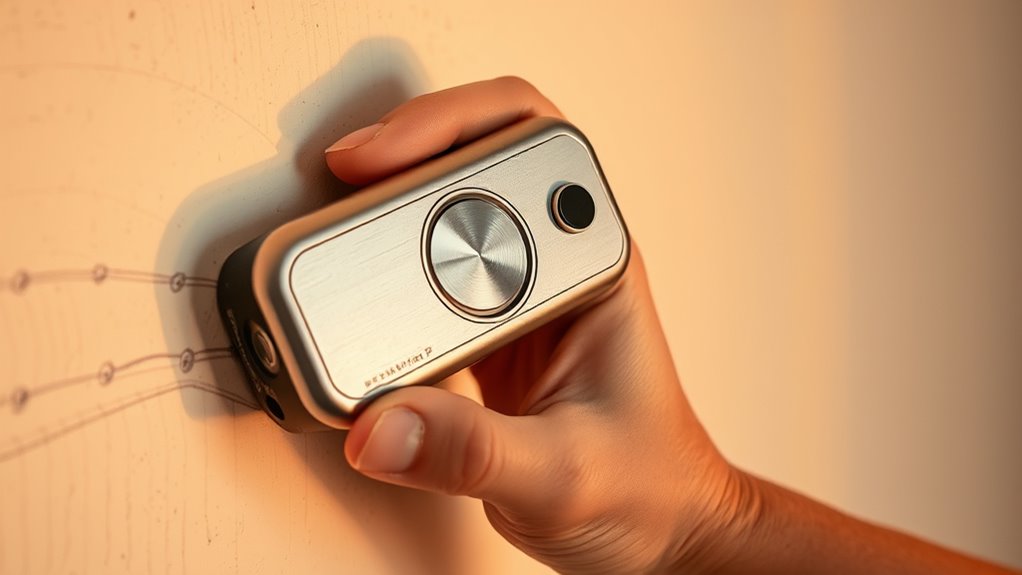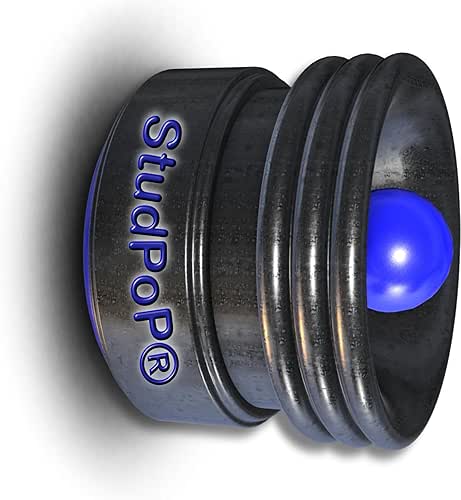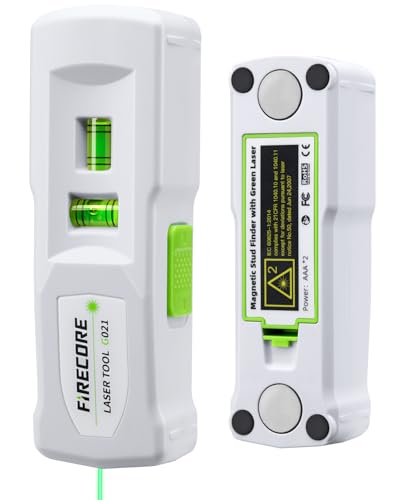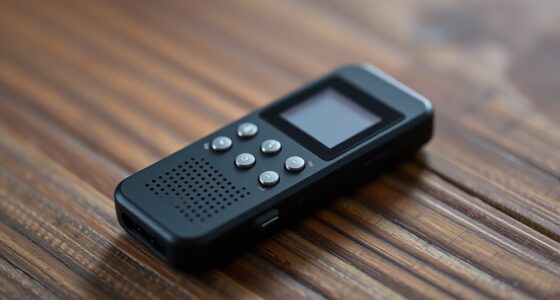Looking for the best magnetic stud finders to make wall hunting easier? I’ve found top options like the StudBuddy, Kreg with laser mark, and StudPoP, all offering reliable metal detection without batteries. They’re perfect for drywall, plywood, and similar surfaces, and many come with added features like levels and audible cues. If you want dependable tools that protect your walls, check out these picks—they’ll help you work smarter and faster, and there’s more to discover below.
Key Takeaways
- Magnetic stud finders use strong neodymium magnets for deep, reliable detection of metal fasteners behind various wall types.
- They are battery-free, portable, and often include features like built-in levels and marking aids for precise wall alignment.
- Suitable for drywall, plywood, and similar surfaces; less effective on textured, thick, or non-metallic walls.
- Affordable and durable, magnetic stud finders prevent wall damage and are ideal for quick, accurate wall hunting and hanging projects.
- Top models combine visual and audible cues, enhancing ease of use and making wall detection faster and more reliable.
The Original StudBuddy Magnetic Stud Finder Tool
If you’re looking for a dependable, straightforward way to find wall studs without fuss, the Original StudBuddy Magnetic Stud Finder Tool is an excellent choice. I love how simple it is—no batteries, no moving parts, just powerful neodymium magnets that stick to screws or nails in studs. It’s made in the USA from durable materials, so I know it will last. I just slide it across the wall, and when it sticks, I’ve found the stud’s location. It works perfectly on drywall and wood walls, making my DIY projects quicker and easier without the hassle of electronic devices.
Best For: DIY enthusiasts and professionals seeking a simple, reliable, battery-free tool to locate wall studs in drywall and wood.
Pros:
- No batteries or moving parts required, always ready to use
- Made in the USA with high-quality, durable materials
- Easy to operate by sliding across the wall to detect screws or nails
Cons:
- Not suitable for use on lath and plaster walls
- Magnetic detection may be less precise on very uneven surfaces
- Limited to finding studs through drywall and wood, not metal or other wall types
Kreg Magnetic Stud Finder with Laser-Mark
The Kreg Magnetic Stud Finder with Laser-Mark stands out for its combination of magnetic detection and laser projection, making it an excellent choice for DIYers and professionals who need precise, quick stud locating. Its compact, lightweight design (just 4.6 ounces) features two strong rare-earth magnets that latch onto wall nails or screws for hands-free operation. The built-in laser projects the stud’s exact location, while the bubble level guarantees vertical accuracy. Perfect for small projects like hanging pictures or shelves, it offers reliable detection on drywall, though it’s less effective on complex wall surfaces. Overall, it’s a versatile tool that balances magnetic strength with laser guidance for accurate wall marking.
Best For: DIYers and professionals seeking a compact, precise wall scanner with magnetic detection, laser guidance, and leveling for small projects and quick stud locating.
Pros:
- Combines magnetic detection with laser projection for accurate stud location
- Compact, lightweight design with easy, hands-free operation using magnets
- Built-in bubble level ensures vertical alignment and precise marking
Cons:
- Less effective on complex or multi-layer walls like lathe and plaster
- Laser projection range limited to one end, reducing coverage flexibility
- Potential false positives if nails or screws are misplaced or missing
StudPoP Magnetic Stud Finder with Visual & Audible Indicators
For homeowners and DIY enthusiasts working on older walls, the StudPoP Magnetic Stud Finder with Visual & Audible Indicators stands out as an ideal choice. It detects metal fasteners like nails and screws, giving clear visual and audible signals when it finds one. Highly sensitive, it works effectively on surfaces like plaster, lath, and tile—surfaces that often challenge electronic models. No batteries or calibration are needed, making it simple and reliable. Its lightweight, compact design makes it easy to handle, and the magnetic pop-up cue adds a fun, intuitive element to wall hunting. Many users find it quick, accurate, and perfect for older homes.
Best For: homeowners and DIY enthusiasts working on older walls who need a simple, reliable tool to locate studs behind challenging surfaces like plaster, lath, or tile.
Pros:
- No batteries or calibration required, ensuring consistent, hassle-free operation
- Highly sensitive and effective on various surfaces, including plaster, lath, and tile
- Lightweight, portable, and easy to use with visual and audible cues for quick detection
Cons:
- The magnetic pull can be subtle, requiring careful handling and patience
- May occasionally give false negatives if nails or screws are absent or misplaced
- Slow or cautious movement may be needed for precise detection, which can extend the time needed for thorough wall scanning
CH Hanson 03040 Magnetic Stud Finder Pack of 2
With its compact size and powerful rare earth magnets, the CH Hanson 03040 Magnetic Stud Finder Pack of 2 stands out as a top choice for DIYers and homeowners seeking reliability without the hassle of batteries or calibration. Measuring just 8 x 4 x 2.7 inches and weighing only 1.6 ounces, it’s easy to handle and carry. Its durable casing, soft grip, and built-in level make wall marking straightforward. The magnets easily attach to metal fasteners behind walls, allowing for hands-free detection of nails, screws, or other metal objects. Trusted by many, it’s a simple, effective tool perfect for hanging shelves, mounting TVs, or quick wall scans.
Best For: DIY enthusiasts, homeowners, and professionals seeking a reliable, battery-free tool for detecting metal fasteners behind walls for hanging and mounting projects.
Pros:
- No batteries or calibration required, ensuring easy and immediate use
- Compact, lightweight, and durable design for long-lasting reliability
- Powerful rare earth magnets enable hands-free detection and versatile metal object grabbing
Cons:
- Cannot detect wooden studs without metal fasteners attached
- Limited to metal fastener detection; not suitable for comprehensive wall scanning
- Might require multiple passes or combined use with electronic stud finders for detailed insights
The Original StudBuddy Plus Magnetic Stud Finder with Level
If you’re looking for a simple, reliable tool to find studs and guarantee your hangings are straight, the Original StudBuddy Plus Magnetic Stud Finder with Level is an excellent choice. Made in the USA from durable plastic, it uses strong neodymium magnets to detect screws or nails in studs, with no batteries or calibration needed. The compact design (7.5 inches long) fits easily in your pocket, and the built-in level ensures your items hang straight. It works well on drywall with wooden studs and can even pass through paneling. Its straightforward operation and sturdy construction make it perfect for both DIY projects and professional use.
Best For: DIY enthusiasts and professionals seeking a straightforward, durable stud finder with level for hanging heavy items on drywall and wood studs.
Pros:
- No batteries or calibration required, ensuring quick and easy use
- Strong neodymium magnets reliably detect screws or nails in studs
- Built-in level helps ensure hanging items are straight and properly aligned
Cons:
- Not suitable for lath & plaster walls or metal/concrete surfaces
- Limited to detecting screws or nails, not small nails or metal studs
- Does not feature electronic scanning or depth detection capabilities
Klein Tools Magnetic Stud Finder and Level
The Klein Tools Magnetic Stud Finder and Level stands out for those seeking a reliable, compact tool that combines metal detection with precise leveling. Its powerful rare-earth magnet quickly locates metal studs and fasteners, saving time and effort. The bubble vial ensures accurate markings, while the felt pad backing protects drywall and plaster surfaces from scratches. With features like a center top notch and bottom opening, aligning and marking is straightforward. Whether working on wood or metal, this tool offers versatility and convenience. I find it ideal for quick, accurate wall hunting without risking surface damage, making it a must-have for any DIY or professional project.
Best For: DIY enthusiasts and professionals seeking a compact, reliable tool for quick metal detection and precise wall marking without surface damage.
Pros:
- Combines magnetic stud finder and level in one compact tool for versatile use
- Powerful rare-earth magnet offers quick and efficient metal detection
- Bubble vial and marking features ensure accurate and easy wall alignment
Cons:
- May require multiple tools for optimal accuracy on complex surfaces
- Limited to detecting metal studs and fasteners, not wood framing
- Felt pad backing might wear over time with frequent use
52300 Studball, 27 Pounds Magnetic Stud Finder
As someone who values simplicity and reliability in tools, I find the 52300 Studball magnetic stud finder to be an excellent choice for quickly locating metal studs behind various wall materials. Its strong magnetic pull of 27 pounds makes finding nails or screws in wood or drywall effortless and accurate, even through 5/8″ drywall or up to 3/4″ tile and plywood. No batteries are needed, and you don’t have to mark or interpret data—just run it along the wall, and it instantly detects metal objects. Plus, its versatility extends beyond stud finding; it can pick up small metal items or serve as a magnetic hook, making it a handy multi-use tool.
Best For: DIY enthusiasts, homeowners, and construction professionals seeking a simple, reliable, and battery-free tool for locating metal studs and objects behind various wall materials.
Pros:
- Strong magnetic pull of 27 pounds for quick and accurate detection of nails and screws.
- No batteries required, ensuring maintenance-free and eco-friendly operation.
- Versatile use beyond stud finding, including retrieving metal items and serving as a magnetic hook.
Cons:
- Limited to locating metal objects, so it cannot detect non-metallic materials like wood or plastic.
- Magnetic strength may cause difficulty in use around sensitive electronic devices or in tight spaces.
- Less effective on walls with non-metallic or heavily insulated materials that block magnetic detection.
Magnetic Stud Finder with 360° Level
A magnetic stud finder with a 360° level is perfect for anyone who needs precise, quick alignment during wall mounting projects. Its built-in bubble vial allows me to easily level items both horizontally and vertically, ensuring perfect placement every time. The extra-strong magnet easily detects nails and screws in studs, making locating studs faster and more reliable. Compact and durable, it fits comfortably in my pocket or tool belt, and since it’s battery-free, I never worry about charging or replacing batteries. Whether hanging shelves or mounting a TV, this tool combines magnetic detection with accurate leveling, simplifying tasks and delivering professional results.
Best For: DIY enthusiasts, homeowners, and professionals seeking a reliable, battery-free tool for quick stud detection and precise wall mounting.
Pros:
- Strong magnet that reliably detects nails and screws in studs
- Built-in 360° bubble level for accurate horizontal and vertical alignment
- No batteries required, ensuring consistent performance and easy use
Cons:
- Magnet strength may vary slightly between units
- Some users report the magnet falling out over time
- Limited detection capabilities through very thick walls or dense materials
Moonoom 2 Pcs Magnetic Stud Finder for Wall and Metal Detection
If you’re looking for an affordable and easy-to-use magnetic stud finder, the Moonoom 2 Pcs Magnetic Stud Finder stands out as an excellent choice. Each unit is compact, lightweight, and simple to operate—just glide it across your wall to detect screws and nails. No batteries or power sources are needed, making it perfect for quick, casual jobs. The smooth plastic casing prevents wall damage, and the strong magnets lock onto metal points, ensuring reliable detection on drywall. While less effective on thick or irregular walls, these finders are ideal for DIYers seeking a budget-friendly, straightforward tool for wall mounting and renovation projects.
Best For: DIYers, homeowners, and casual users seeking an affordable, easy-to-use magnetic stud finder for quick wall mounting and renovation projects.
Pros:
- No batteries or power sources needed for operation
- Compact, lightweight, and portable design for easy handling
- Smooth plastic casing prevents wall damage during use
Cons:
- Magnetic strength may be weaker compared to professional tools
- Less effective on thick, irregular, or lath and plaster walls
- Not suitable for heavy-duty or professional-level applications
Powerful Magnetic Stud Finder (Upgraded Version)
The Powerful Magnetic Stud Finder (Upgraded Version) stands out for anyone seeking a reliable, battery-free tool that delivers deep and accurate detection of studs. Reinforced with three strong neodymium magnets, it offers better depth and precision than typical models. Crafted from durable materials, it’s built to last and is easy to use—simply slide it across walls or ceilings to find hidden nails or screws. Its larger size covers more area per scan, speeding up the process. With a transparent design and built-in marking arrows, you can pinpoint fasteners precisely without damaging surfaces. It’s perfect for hanging heavy items like TVs, shelves, or ceiling fans with confidence.
Best For: DIY enthusiasts and homeowners seeking a reliable, battery-free tool for deep, accurate stud detection on various wall surfaces.
Pros:
- Reinforced with three powerful neodymium magnets for enhanced depth and precision.
- No batteries required, ensuring always-ready, maintenance-free operation.
- Large size and transparent design with marking arrows for quick, accurate pinpointing of fasteners.
Cons:
- Not suitable for thick plaster, skim coat, double drywall, or heavy textured surfaces like stucco or popcorn.
- May be less effective on surfaces with heavy paint or coatings that obscure nails or screws.
- Requires manual sliding across surfaces, which may be less convenient in tight or awkward spaces.
2 PCS Magnetic Stud Finders, No Batteries Needed
For anyone seeking a reliable, battery-free tool to locate studs quickly, PCS Magnetic Stud Finders deliver exceptional performance. These compact tools use strong neodymium magnets to detect screws, nails, or metal studs through drywall and wood, with no calibration needed. Made from durable ABS plastic, they’re simple to use—just move them slowly across the wall’s surface, and they’ll stick when over a stud. Perfect for hanging shelves, TV mounts, or pictures, these finders are lightweight and cost-effective. They’re especially valued for their speed and reliability, making drywall wall hunting easier without the hassle of batteries or complex settings.
Best For: DIY homeowners and professionals seeking a quick, reliable, battery-free tool for locating studs behind drywall and wood without wall damage or calibration.
Pros:
- No batteries required, ensuring hassle-free operation and long-term use
- Easy to use with simple circular motion, providing quick and accurate stud detection
- Made of durable ABS plastic with strong neodymium magnets for reliable performance
Cons:
- Not suitable for textured walls or lath and plaster surfaces
- May have limited effectiveness on corner or edge detection due to magnet strength
- Requires slow, careful scanning for best results, which may take more time in some situations
Dreyoo 2 Pcs Stud Finder Wall Scanner
With its powerful 27-pound magnetic pull and no-battery design, the Dreyoo 2 Pcs Stud Finder Wall Scanner stands out as an ideal tool for DIY enthusiasts and homeowners. Its magnetic force easily detects metal behind drywall, plywood, or ceramic tiles up to 3/4 inch thick, making it versatile and reliable. The compact design, with a 0.63-inch diameter stud ball, allows for precise, quick detection of studs, screws, or keys in tight spaces. Lightweight and portable, it’s perfect for hanging pictures or shelves without help. Many users praise its strong magnet and ease of use, making it a practical, cost-effective addition to any toolkit.
Best For: DIYers, homeowners, and decorators looking for a portable, battery-free tool to easily locate studs and metal objects behind various wall materials.
Pros:
- Strong 27-pound magnetic pull force for reliable detection of studs and metal items
- No batteries required, making it convenient and low-maintenance
- Compact, lightweight design ideal for quick and precise use in tight spaces
Cons:
- Magnets can be lost or fall out of rubber sleeves if not handled carefully
- May not detect metal objects behind thicker or denser materials beyond 3/4 inch
- Less advanced than electronic stud finders, potentially limiting precision for certain applications
Firecore Magnetic Stud Finder with Laser and Bubble Vials
If you’re looking for a versatile magnetic stud finder that combines precision and convenience, the Firecore Magnetic Stud Finder with Laser and Bubble Vials stands out. It’s compact, durable, and perfect for drywall and wood surfaces. The device features strong magnets that latch onto screws or nails, a high-visibility green laser line for accurate marking, and bubble vials for leveling. Weighing just 2.47 ounces, it’s easy to carry and store. Its shock-resistant build and rubber pads protect walls during use. While primarily designed for drywall and wood, it offers reliable detection and precise alignment, making it an excellent choice for DIY projects.
Best For: DIY enthusiasts and homeowners seeking a reliable, easy-to-use magnetic stud finder with laser guidance for drywall and wood wall applications.
Pros:
- Combines magnetic stud detection, laser line projection, and bubble vials in one compact device
- Lightweight and portable at only 2.47 ounces, making it convenient for on-the-go use
- Easy to operate with no batteries needed for metal detection and clear laser guidance for precise marking
Cons:
- Less effective on lath-and-plaster walls and with small nails or fasteners
- Laser may flicker or malfunction over time, reducing accuracy
- Bubble vials can be difficult to see in low-light conditions and walls with textured surfaces
Factors to Consider When Choosing Magnetic Stud Finders
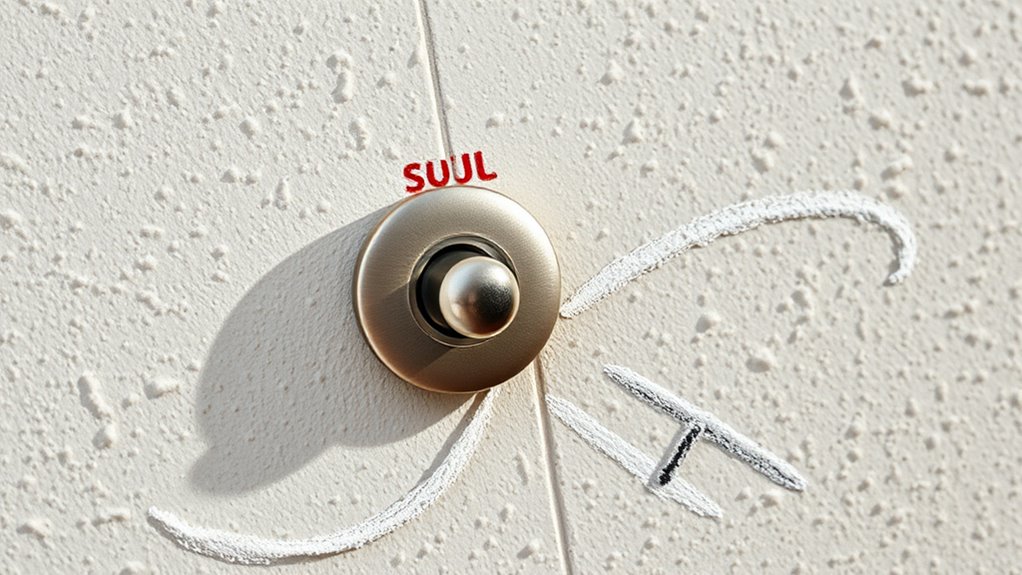
When choosing a magnetic stud finder, I focus on factors like magnet strength and how well it pulls to metal, since that affects accuracy. I also consider wall compatibility and ease of use to make sure it fits my projects, along with durability and size for convenience. These points help me pick a tool that’s reliable, simple, and suited to my needs.
Magnet Strength and Pull
The strength of a magnet in a stud finder directly impacts its ability to detect metal fasteners hidden behind walls. Stronger magnets with higher pull force, like 27 pounds or more, are more effective at gripping onto nails or screws, especially in dense or thick walls. The number of magnets and how they’re arranged also matter; multiple magnets can boost detection sensitivity. The pull strength is measured by how much force it takes to detach the magnet from a metal surface—greater force means better performance. Weaker magnets might need slower, more deliberate movements and can struggle on walls with irregular stud placements or non-metal fasteners. Overall, choosing a magnet with sufficient pull force ensures more reliable and accurate wall hunting.
Wall Compatibility Range
Choosing the right magnetic stud finder depends heavily on the wall material you’re working with. These tools work best on drywall, plywood, and similar surfaces where metal fasteners are accessible. However, they’re less reliable on textured, thick, or uneven walls. Compatibility varies based on wall construction; magnetic finders often struggle with lath and plaster or dense, non-metallic layers. If your wall lacks metal studs or fasteners, a magnetic stud finder won’t detect anything. Some models can penetrate multiple wall layers, but their effectiveness diminishes as wall thickness increases or if non-metallic sheathing is present. Understanding your wall type and construction is essential to choosing a tool that will reliably locate studs in your specific situation, ensuring accurate and efficient wall hunting.
Ease of Use Features
Ease of use is essential when selecting a magnetic stud finder, as you want a tool that’s quick and effortless to operate. Look for models that require no batteries or calibration, so they’re always ready to go without fuss. Strong neodymium magnets ensure secure attachment to metal fasteners, making detection reliable and straightforward. Additional features like built-in levels or laser guides can boost accuracy and simplify marking stud locations. Opt for lightweight, compact designs that are easy to maneuver—perfect for quick, one-handed use and hassle-free storage. User-friendly features such as audible signals or visual indicators confirm detection without needing technical knowledge. These ease of use features make wall hunting faster, safer, and less frustrating, helping you complete projects with confidence and minimal effort.
Durability and Build
When selecting a magnetic stud finder, durability and build quality play a vital role in ensuring reliable performance over time. I look for tools made from high-quality materials like reinforced plastic, stainless steel, or encapsulated neodymium magnets, which resist wear from frequent use. The magnet strength should stay consistent, so I can trust the device to detect studs reliably after multiple uses. A sturdy, shock-resistant casing and impact-proof design protect internal components from drops and bumps, extending the tool’s lifespan. Additionally, a compact, lightweight build reduces stress on parts and minimizes damage when accidentally dropped. For outdoor or humid environments, weather-resistant or corrosion-proof finishes are essential, helping the finder maintain its appearance and functionality over time.
Size and Portability
Size and portability are crucial factors to contemplate when selecting a magnetic stud finder, especially if you need a tool that’s easy to carry around. Compact models often measure less than 5 inches, making them simple to slip into a pocket or tool kit without adding bulk. Their lightweight design, typically under 2 ounces, minimizes hand fatigue and improves maneuverability during use. Many portable stud finders feature straightforward, single-piece construction without batteries or moving parts, which boosts durability and makes them even easier to transport. Thanks to their small size, these finders allow quick scanning across walls, perfect for DIY projects or quick adjustments. Their portability makes them ideal for multiple job sites or household tasks, ensuring you’re always ready when a wall-hunting need arises.
Additional Tools Included
Many magnetic stud finders come equipped with extra tools that enhance their functionality and accuracy. For example, built-in levels, laser guides, or calibration markers help you align and mark studs more precisely during installation. These features reduce errors and make the process smoother, especially for detailed projects. Some models include backup ropes or magnetic holders, which are handy for retrieving or locating metal objects behind walls. Incorporating additional tools into a magnetic stud finder can also boost efficiency by combining detection and measurement functions in one device, saving you time and effort. Overall, these extra features increase versatility and ease of use, making your wall-hunting tasks more straightforward—whether you’re a DIY enthusiast or a professional seeking reliable, multi-purpose tools.
Price and Value
Choosing the right magnetic stud finder often depends on balancing cost with features, as prices can vary considerably. Basic models are usually affordable, around $7 to $10, making them great for casual projects. More advanced options, costing $15 to $20, may include features like laser guides, bubble levels, or multiple magnets, which can improve accuracy and ease of use. Investing in a higher-priced model often means better magnetic strength, durability, and reliability, reducing false readings or failures. Compared to electronic stud finders, magnetic models tend to be more budget-friendly, require no batteries, and offer long-term value. When evaluating price and value, consider how often you’ll use the tool and whether additional features justify the extra cost for your specific needs.
Safety and Wall Protection
When selecting a magnetic stud finder, safety and wall protection should be top priorities. I look for models with smooth surfaces and rounded edges to minimize wall damage during use. A strong pull magnet reduces the need to press hard, lowering the risk of punctures or dents. Handling the device gently and moving slowly across the wall helps prevent scratches or marks, especially on delicate or painted surfaces. Choosing a stud finder with a non-abrasive coating or padding adds extra protection for finished or textured walls. It’s important to avoid applying excessive force or rapid sliding, as this can dislodge wall coatings or damage fragile materials like wallpaper or plaster. Prioritizing safety and wall care ensures a smooth, damage-free wall-hunting experience.
Frequently Asked Questions
How Do Magnetic Stud Finders Differentiate Between Metal Types?
Magnetic stud finders don’t actually differentiate between metal types; they simply detect magnetic fields. When I use one, it’s attracted to any ferromagnetic metal, like nails or screws in studs. They can’t tell if the metal is steel, iron, or another magnetic metal. So, I focus on locating consistent magnetic spots that indicate framing, knowing they’re likely to be steel or iron rather than non-magnetic metals like copper or aluminum.
Are Magnetic Stud Finders Effective on All Wall Surfaces?
Magnetic stud finders work well on most wall surfaces, but their effectiveness can vary. I’ve found they’re great on drywall and plaster, where metal studs are usually close to the surface. However, on textured or uneven walls, or if there’s insulation or other obstructions, they might not be as reliable. Still, I recommend trying them first—they’re simple, portable, and often do the job with a little patience.
Can Magnetic Stud Finders Detect Electrical Wiring?
Magnetic stud finders can’t detect electrical wiring directly. However, they are great for locating nails or screws in the wall, which often indicate where studs are, helping you avoid wiring behind those areas. To find live electrical wires, I recommend using a dedicated wire detector or non-contact voltage tester. Combining both tools guarantees safer wall scanning, especially when you’re drilling or hanging heavy items.
What Is the Maximum Detection Depth for Magnetic Stud Finders?
Think of magnetic stud finders as tiny treasure hunters. They usually detect metal objects up to about 3/4 inch to 1 inch deep, but their precision drops with thicker walls or denser materials. I’ve found that they’re perfect for finding nails or screws in drywall, but if you need to locate studs behind thick plaster or concrete, you’ll want a more advanced scanner. They’re great for quick, surface-level wall checks.
How Do Environmental Factors Affect Magnetic Stud Finder Accuracy?
Environmental factors can substantially impact a magnetic stud finder’s accuracy. I’ve noticed that metal objects like pipes or screws near the wall can cause false readings. Also, electrical interference from nearby wiring or appliances can make it harder to detect studs correctly. To get the best results, I always ensure the area is as free from metal clutter and electrical noise as possible before scanning.
Conclusion
Like Indiana Jones on a quest for hidden treasures, finding the perfect magnetic stud finder makes wall hunting feel like an adventure rather than a chore. Whether you prefer simple hand-held tools or those with added laser and level features, there’s something here for everyone. With these reliable options, you’ll uncover studs with confidence, turning what once felt like searching for a needle in a haystack into a straightforward treasure hunt. Happy hunting!
